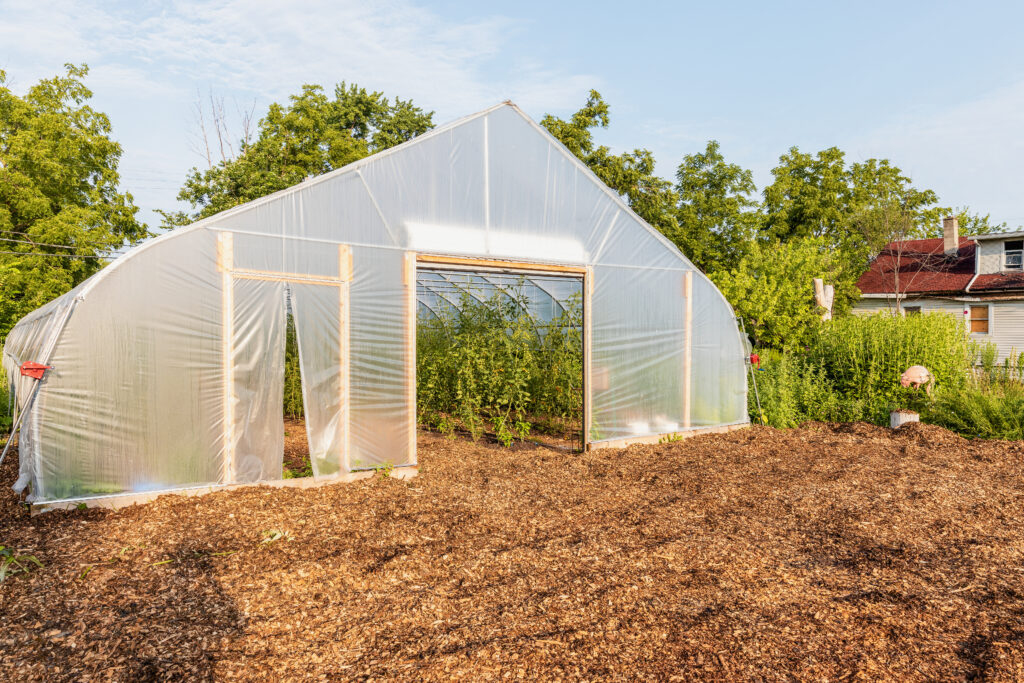The Michigan Climate Smart Farm Project (MCSFP) is an exciting new opportunity for small farmers to assess and improve their impact on the environment. The project seeks to measure the ecological footprint of farm systems and make implementing climate-smart practices more accessible. Most incentives currently available are more applicable to industrially grown crops, making many climate-smart practices challenging for small, diversified farm operations to implement.
The MCSFP is building off an existing program called the Michigan Agriculture Environmental Assurance Program (MAEAP), which provides verification to small farms (under 179 acres) that voluntarily prevent or minimize pollution risks. Through education, on-farm risk assessments, and third-party verifications, farms can earn a MAEAP certification in four categories: Cropping System, Farmstead System, Livestock System, or Forest, Wetlands, and Habitat System.

Why Climate Smart Agriculture
Industrial agriculture changed how food is grown worldwide–agriculture now relies on heavy equipment powered by fossil fuels, and there’s a lot of evidence about greenhouse gases created by Concentrated Animal Feed Operations (CAFOs). With climate change wreaking havoc on growing seasons, increasing pest pressures, and causing unpredictable weather, there is more pressure than ever to assess our farming practices and move towards more climate-friendly actions.
Promoting climate-smart agriculture and forestry practices is a pivotal step towards protecting our environment and food system while supporting small farms’ resiliency in the new climate future.
How Does The Michigan Climate Smart Farm Project (MCSFP) Work
The MCSFP is split into three phases–the first being the current exploration and development phase. To start, the project is focused on Washtenaw, Wayne, Lenawee, and Monroe counties. A selection of farms from each of the four counties will participate in a paid study from 2023-2025 that collects data to establish a Life-Cycle Analysis (LCA) and a baseline for climate emissions associated with agricultural activities.
Farmer questions and reporting methods will follow the existing MAEAP program for greenhouse gas measurement and verification. After analysis, the program will have clear standards for how a verifiable “Climate-Smart Farm” operates.
The three-year pilot program will launch in 2025, with a final report presented to MDARD in 2028. The MCSFP ideally will become a part of the existing MAEAP system, or operate similarly but as a standalone program.
Project Goals
MCSFP seeks to determine what practices will result in the largest reduction in greenhouse gas emissions, with goals to:
- Determine what agricultural practices result in the largest reduction of emissions
- Find a verifiable way to ensure crops are grown using climate-smart practices
- Unite partners doing the work to implement climate-smart agriculture and forestry practices
- Develop a clear system for measurement and verification of greenhouse gas emissions and net carbon sequestration
- Create a system to reward early adopters of climate-smart practices, that is inclusive and able to be replicated and scaled
A key component of the program is mitigating the risk of adopting new climate-smart systems and making these systems accessible to small, diversified farms. Farmers will benefit from seeking Climate-Smart Farm Verification in the following ways:
- Opportunities for cost-share payment programs that support the transition to climate-smart farming
- Eligibility to sell carbon credits for supplemental income
- Access to Climate Smart Farm branding package and logos, which allows them to use their verification as a marketable certification that consumers will learn to recognize and trust, bolstering local food sales and incentivizing the program to farms more widely.
Michigan farmers are encouraged to sign up for the MCSFP newsletter to learn more about climate-smart agriculture and forestry, cost-share opportunities, marketing support, and the new Climate Smart Farm Verification program.
A Community Effort
MCSFP includes the following additional partners:
- Carbon Yield
- Washtenaw County Conservation District
- Lenawee Conservation District
- Monroe Conservation District
- Wayne Conservation District
- University of Michigan SEAS
- Michigan Association of Conservation Districts (MACD)
- Taste the Local Difference
- Keep Growing Detroit
- MDARD Environmental Stewardship
- The Soil Inventory Project
Stay Up-To-Date With Climate Smart Agriculture
Incentivizing climate-smart agriculture and forestry practices is an important step forward for Michigan farmers. Even if you’re not a farmer, you can stay informed about the new MCSFP by signing up for the email newsletter.
Carrie Hause is the Digital Media Specialist for Taste the Local Difference. Contact her at [email protected].
